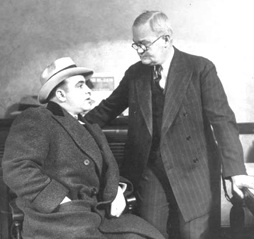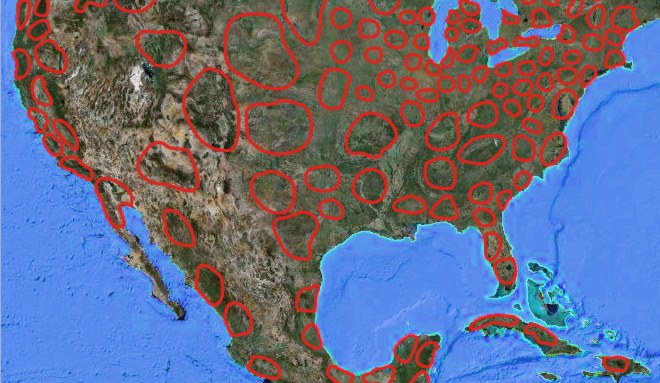The areas that are especially beautiful, such as Yellowstone
National Park, would be classified as World Parks that belong to the entire
world rather than a nation. The undesirable land areas would also belong
to the entire world.
Each nation would be forbidden to expand their boundaries. A nation
could let their population decrease, but they would not be allowed to go
over a certain maximum. Immigration would have to be controlled; immigration
would be by invitation only.
If these separate nations were to behave in the same selfish manner
that nations are behaving today, it would be extremely annoying and wasteful.
Imagine having to fill out forms to mail a package from one nation to another,
as we do today. Or imagine trying to do business between nations when they
have different rules, tariffs, and other regulations. Or imagine trying
to travel between nations if each one required customs inspections.
To prevent these problems, each nation would be only semi-independent.
They would be completely independent with clothing styles, food, music,
architecture, and other social issues, but independence would not be permitted
in regards to technical issues, such as electric power, television signals,
airplane maintenance. The nations would also be required to use the same
monetary system, calendar, number system, and ideally the same language,
or at least the same secondary language. A person would need only one form
of identification, and it would be valid everywhere in the world. Nobody
would need passports.
Each nation would be allowed to determine what race their citizens are.
No nation would be under obligation to allow other races to immigrate into
their nation. The end result is that one nation might consist entirely
of a certain type of Chinese, another might be a group of Bavarian Germans,
and another might choose to be a mixture of races.
Every nation could also make their own decisions on how they want their
homes and cities to be. For example, one nation might be designed for private
homes on private plots of land with privately owned automobiles, and another
nation may prefer to experiment with cities that are like college campuses
in which there is no private property, and public transportation provides
for almost all of the transportation.
Each nation could determine what type of food they wanted to promote.
For example, one nation might eat cows, cow milk, and alcoholic beverages,
and they might prohibit the eating of cats, horses, dogs, and rats. Another
nation might permit the eating of dogs and horses and prohibit alcohol
and animal milk. Another nation might prohibit dogs and cats as pets. No
nation would be allowed to force their beliefs on another.
Another way to understand this concept of semi-independent nations is
to imagine if the cities within your nation were physically separated from
each other and allowed to be independent in regards to social issues. Because
all of the cities belong to the same nation, their economies would function
as one economy, but each city would be different from a social perspective.
The United Nations
These semi-independent nations would need an organization to
provide supervision, similar to the United Nations. The current UN doesn't
function properly partly because the world is dominated by a few giant
nations and by the Zionist crime network, but in a world in which all nations
are virtually the same size, an organization similar to the UN would become
practical.
The UN would coordinate the economies so that the nations function as
if they are one, giant economy. Businesses could have branches in different
nations, just as they do today, but it would be much easier with these
semi-independent nations because there would be no differences in regulations,
laws, or other business practices. From the point of view of businessmen,
the separate nations are separate cities of a world-wide nation.
Each nation would deal with transportation within its own cities, but
the UN would be responsible for handling the trains, boats, airlines, and
roads that connect the nations together. People and freight could travel
to any nation without any concern about paperwork, regulations, or passports.
| High-speed trains would be especially practical for shipping freight
and passengers between nations because there would not be any small towns
along the route to slow them down. |
|
 |
The UN would manage the vacant land between the nations, the
oceans, the large rivers, the Panama Canal, and all of the World Parks.
Projects that are too expensive for individual nations or businesses, such
as the launching of satellites into orbit, or projects that affect several
nations, such as large dams on big rivers, would be handled by the UN.
In some cases the UN might hire some of its own engineers or construction
crews, but in most cases the UN would coordinate the activities between
different businesses.
The UN would make sure the nations are not polluting one another; that
they are not producing military weapons; and that their businesses are
not cheating other nations. The UN would also prevent the wealthy nations
from using people from poor nations as servants or cheap labor.
Some nations will have a lot of oil, and others will have a lot of iron
ore, and others might have access to enormous hydroelectric or solar power.
However, no nation or business would be able to own or manipulate any of
the world's resources. Every person and every nation would be required
to contribute to the world. No nation or person would be allowed to be
a parasite that uses its supply of resources to live off the work of others.
The UN could have its own land area, thereby making it a nation, also,
but computers and modern communication technology allow the UN to operate
without its own land. Every nation would provide their own UN building
within their nation, and every nation would select some of their citizens
to become UN employees. All of the UN employees and buildings in all of
the nations would be the "United Nations". The nations would also contribute
people to inspection teams whenever the UN needed to check on weapons development,
pollution, or other problems.
There would be several different
"criminal nations"
As mentioned in the Dumbing Down series, jail is absurd, and
most people resist killing criminals, so by creating a few "criminal nations",
every nation could dispose of their badly behaved people without much guilt.
We could have several different criminal nations, such as one for the violent
people, and another for people who commit trivial crimes.
How would the UN deal with badly
behaved nations?
The American attitude towards dealing with badly behaved government
officials is to assassinate the leaders, torture the citizens with economic
embargoes, and drop bombs on the nation. This absurd attitude seems to
be coming from the Zionists who are tricking the Americans and Europeans
into destroying themselves and other nations.
The current attitude towards dealing with badly behaved businessmen
is to make their business pay a small fine. This policy is not
preventing abuse by businessmen.
In a world of semi-independent nations, none of the nations would be
allowed to develop a military force, so when government officials are caught
behaving badly, such as when they are allowing their nation to pollute
their neighbors, the UN would not have to use any military force to deal
with the problem. Instead, they would have the authority to demand the
nation select new leaders.
If the UN determines that the government leaders are merely incompetent
and are making honest mistakes, the UN would demand that the leaders be
replaced and be barred forever from getting another top government position,
but if the UN determines that they were deliberately misbehaving, they
would be sent to a criminal nation.
This same policy would apply to businessmen who abuse other nations.
Specifically, the UN would have the authority to demand that the businessmen
be replaced if they are merely incompetent or making honest mistakes, and
the UN would have the authority to send them to a criminal nation if they
determine that they were deliberately misbehaving.
The UN would have the attitude that leadership positions are a privilege,
and if somebody abuses that privilege, they are removed permanently.
There is no shortage of people, so we don't have to recycle the badly behaved
people.
The UN would be allowed to put together teams of inspectors and police
forces, but the teams would be required to be temporary, so they would
have to disband after a certain period of time. If another team was needed
later, the team would have to consist of a certain percentage of new people,
thereby making it difficult for the team members to get to know one another
and conspire together. Furthermore, the teams would consist of people from
every nation, which would make it difficult for anybody to get control
of one of the teams.
The UN would have to prevent jealousy and fights by looking into accusations
of cheating and corruption, and if they determine that a nation is suffering
due to their own behavior, they must stand up to that nation and tell them
to accept what they are. For example, if one of the Japanese nations decide
to work six days a week, 16 hours a day, then they will have a lot more
material wealth than the nations that work fewer hours. The nations that
want more leisure time will have to accept this.
The UN would not make any attempt to distribute the wealth from one
nation to another. Each nation would be told to take care of themselves,
be responsible for themselves, be considerate of other nations, and accept
the life they make for themselves.
Advantages of semi-independent nations
If the world consisted of thousands of small, semi-independent
nations of equal size, it would be impossible for any nation to dominate
the world or develop a significant military force. It is conceivable that
some nations conspire together, and it is conceivable that large, organized
crime gangs form in many nations, but if we can create a United Nations
organization that watches for these conspiracies and organized crime gangs,
it would be very difficult for them to get away with much abuse.
It should be noted that organized crime networks are constantly being
identified and exposed. Police detectives, government officials, and even
ordinary citizens have been complaining about the Gambino family, the Zionist
crime network, and other organized crime gangs for decades.
It's impossible to conduct large-scale crimes without people noticing the
crimes and identifying some of the people within the crime network. These
gangs are not getting away with their
crimes because nobody can figure out what they're doing. Rather, they get
away with their crimes because most people don't
care.
The September 11 attack should make this concept extremely obvious.
Some of us have been pointing out for years that 9/11 was a false flag
operation, and that the Zionist crime network was the primary group behind
it. However, the majority of scientists, engineers, professors, policemen,
firemen, and military officers are lacking whatever mental qualities are
necessary to face this issue.
If we create a United Nations with the same sort of animal-like, selfish,
emotionally disturbed people who currently dominate the nations today,
then of course a world of semi-independent nations will suffer from corruption,
organized crime gangs, and inefficiency.

Creating a better government structure is only part of the
solution to our problems. The other part of the solution is getting better
people in control of the world. History shows that most people
have a mind that is suitable only to primitive life; they cannot handle
the problems we face today. If we continue to allow these intelligent monkeys
to dominate our economy, government, media, and schools, we're going to
continue to suffer.
Disadvantages of semi-independent
nations
A disadvantage is that it would be difficult for people to
emigrate to another nation. Immigration would have to be controlled. If
you wanted to emigrate to another nation, you would have to ask
the nation to accept you. You could not simply move to their nation just
because you wanted to.
In order for you to be accepted by another nation, the other nation
would have to approve of you, but why would they want you? You would have
to truly want to join their society, and they would have to want you.
As discussed in Part 2 of this series, most of the immigration that
is occurring in the world today is abusive,
not constructive. Most immigrants are looking for money, or trying to get
away from the police, or trying to get away from ridicule. Most of them
have no desire to join the nation they are moving to. This is why the immigrants
rarely adapt to their new society; instead, they continue to behave as
if they are still in their original nation.
In a world of semi-independent nations, immigration would occur only
when people truly want to join another nation. For example, the nations
that promote individually owned automobiles will attract people interested
in that lifestyle, and the nations that provide public transportation will
attract people who want to avoid personal vehicles. Nations that prohibit
pets would attract people who don't want to live with animals, and nations
that allow pets will attract people who enjoy animals. Some nations may
attract a lot of scientists, some may attract lots of computer programmers,
and others may attract a lot of musicians.
We have opportunities, but will
we use them?
There are lots of ways to design nations, cities, governments,
and the world. We are not helpless. We can begin the process of improving
the world whenever we find enough people who want to start discussing these
issues and start experimenting with our societies. Unfortunately, the majority
of people have so far shown no interest in doing anything except titillating
themselves.
Our obsession with goals is inappropriate
today
One of the reasons it's difficult to get people to agree on
how to improve the world is because most of the population is certain that
they must have something in particular in order to be happy. Any attempt
to change the world will cause these people to worry that they won't be
able to be happy because it will require that they change their goals in
life.
As discussed in part 2 of this series, the most exciting thing for humans
and animals is the pursuit of our goals,
not the achievement of our goals. Unfortunately, most people make the mistake
of assuming that achieving the goal will bring them happiness. This causes
them to resist attempts to change their goals.
For example, if a man has set a goal for himself of owning a large,
single-family home, a large plot of land, and several automobiles, he will
resist attempts to create cities in which that type of home is non-existent
or difficult to acquire. He will complain that he cannot possibly be satisfied
with life unless he can achieve his goal. He will behave like a child having
a tantrum:
"No! I cannot be happy in that type of city! I must have
my own home! I must have my own plot of land! I must have at least one
personal automobile! I cannot possibly be happy with the society you are
suggesting!"
|
 |
This obsession with a goal was an acceptable behavioral tendency
in 20,000 BC because in that era the only goals that men would set for
themselves were finding food, raising a family, and defending their family
from predators. They would frequently achieve their goals by finding some
food, or chasing away a wolf, but the next day they would have to start
over and pursue the same goals again. This endless pursuit of goals kept
them happy in what appears to us to be a horrible environment.
Today the obsession men have with achieving goals can become absurd
-- and destructive -- if they set ridiculous goals for themselves, and
if they foolishly believe that they must achieve their goals. Many men
have become obsessed over acquiring specific houses, boats, airplanes,
automobiles, jobs, fame, or sports awards. They convince themselves that
they must actually achieve these goals in order to be happy. As a result,
any attempt to take these goals away from them results in anger or tantrums.
Women also become obsessed with goals, but because of their submissive
personality, they often become convinced that they need men to provide
them with whatever it is they're obsessed with. Many women will have tantrums
if their husbands don't provide them with diamonds, for example, or if
they are not provided with a certain type of house or lifestyle.
Every adult should be able to understand this issue of obsessing over
goals simply by looking at their own childhood. It seems that everybody
becomes obsessed to some extent with something during his childhood.
When I was perhaps eight years old, I often fantasized about having
two clear, Lucite rectangles that were about 2 feet on each side and about
8 feet tall. One would be filled with M&Ms, and the other was a solid
block of chocolate. Years later I saw the Beverly Hillbillies mansion on
television, and I was fascinated by the staircase in their mansion. For
many, many years I wanted to have a mansion with that type of staircase.
I also loved to climb trees, and I wished I could jump from one branch
to another, or fly like a bird. I knew I couldn't, so I would dream of
someday having an airplane.
Fortunately, I slowly began to understand that it makes no difference
if I achieve any of my goals, and I also realized that if I had achieved
my goals, I would have discovered that they were not what I thought they
would be. For example, when I climbed up into a tree and sat in the branches,
it was very peaceful and quiet. I assumed an airplane would be similar,
but later I discovered that small airplanes are actually noisy, cramped,
and uncomfortable.
Do you need your own kitchen and
dining room?
If people are obsessed with having a particular type of home,
a particular automobile, or a particular lifestyle, they will resist attempts
to make changes to society. In order to make a better world, we must get
used to the idea that some of our goals must change. To help you understand
this, consider a society in which homes do not have kitchens or dining
rooms; a society in which the people are expected to eat at restaurants
or have picnics. Can you give this
type of society some serious consideration? Or do your obsessions with
dining rooms, breakfast rooms, and kitchens make it impossible for you?
There are several different ways to set up a city in which people don't
need their own kitchens or dining rooms. One method is to design the economy
so that restaurants are classified as a government service, similar to
how we consider schools to be a service that the government should provide.
In this scenario, the government would provide lots of restaurants throughout
a city, and the government would handle all of the finances, maintenance,
and repairs. If a person wanted to operate a restaurant, he would apply
for the job as a restaurant manager. He would be an employee, just like
the employees of a public school. He would not need to invest any money
or buy any equipment. He would decide what type of food he wanted to offer,
and he would have control over the decor of the restaurant.
| One manager might decide to operate a sushi bar, a Turkish delicatessen,
a raw foods bar, or a bakery.
Other managers may provide only food "to go" for people in a hurry,
or who want food for picnics.
Some managers might restrict their restaurant to adults only. |
|
 |
| Some managers might chose to operate an outdoor cafe, and some might
combine the serving of food with singing, dancing, or other entertainment.
Some managers might prefer to offer only fruits, sprouts, juices, drinks,
and other snacks. |
|
 |
| Some managers might prefer to operate formal dining rooms, and they
may require reservations so that they can plan for the upcoming meals.
Some managers might offer only the equivalent of "prix fixe" menus in
which there are no menu options, and the menu changes according to the
manager's desires. |
|
 |
Because the restaurant managers would not have to pay rent
or deal with other financial issues, they could work a normal work week.
The restaurant would be closed during their days off, and when they were
feeling sick. This type of arrangement would make operating a restaurant
the same as every other job.
By removing the risks and stress that is inherent with restaurants today,
more people would be willing to get involved with operating a restaurant.
A city would need a lot of restaurants in order to feed the entire population,
so it is imperative that people be attracted to the job of operating a
restaurant.
The citizens would not have to pay for meals in this scenario. Since
everybody has to eat, the restaurants would be available to everybody at
no charge. The success or failure of a restaurant would depend upon whether
people were interested in the restaurant, not according to profits. If
a restaurant did not attract many people, the manager would have to find
some other job, and somebody else would be given the opportunity to manage
the restaurant.
The restaurant managers would not have to pay for anything, either.
Each manager would simply request whatever supplies and equipment that
he needed, and unless he was asking for something in short supply, he would
be provided with whatever he asked for. If an item was in short supply,
the managers would have to take turns having access to it.
Some people might like cooking their own meals once in a while, so the
city could provide kitchens and dining areas for people to use when they
were in the mood to make their own meals. It would be similar to how parks
provide barbecue pits.
This system of providing food would not work well unless it was very
easy for people to get to the restaurants. The cities that we have today
would make it impractical to use this system, especially during bad weather.
A city would have to be designed with this system in mind. For example,
homes would have to be clustered together rather than scattered haphazardly
throughout the city, and restaurants would have to be built within the
clusters so that people can walk or ride an elevator to the restaurants.
Restaurants would also have to be scattered throughout the area where
people were working in the city. People would have to be able to get to
the restaurants even during bad weather, and that would require covered
walkways and transportation that is easy and quick, such as conveyor belts
or electric vehicles.
There would be a lot of advantages to this type of food distribution
system, some of which are:
| |
Efficiency. It is much more efficient
for restaurants to provide meals. It also simplifies the delivery of food
and the disposal of garbage. |
| |
Socializing. People would be forced
to leave their home in order to eat, thereby encouraging people to socialize.
For example, when a man is finished working, instead of going home to his
family for dinner, he would meet friends or family at a restaurant. When
the weather is nice, he might pick up some food and meet his friends or
family at a park. |
| |
More leisure time. By eliminating
the kitchen and dining rooms, people wouldn't have to waste time shopping
for food, preparing meals, or cleaning up the mess. |
| |
Better food. When people cook for
themselves, they tend to make simple meals, but the restaurants would provide
a wide variety of food, and it would be easy for the restaurants to offer
extremely fresh food, such as meat from animals that were slaughtered that
same day, and bread that was made from freshly ground grains. |
| |
Artistic variety. Instead of eating meals in the same room of
our home day after day, restaurants would provide a lot of variety. And
restaurants can afford to provide much more expensive decorations, art,
stained-glass windows, flooring materials, and gardens. |
|





